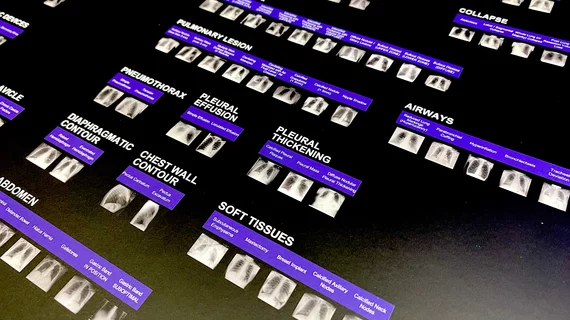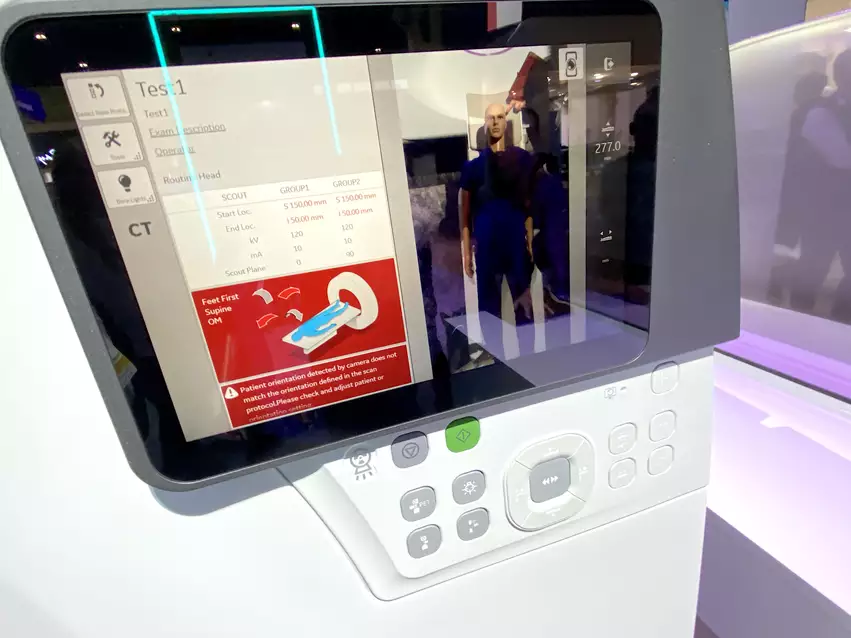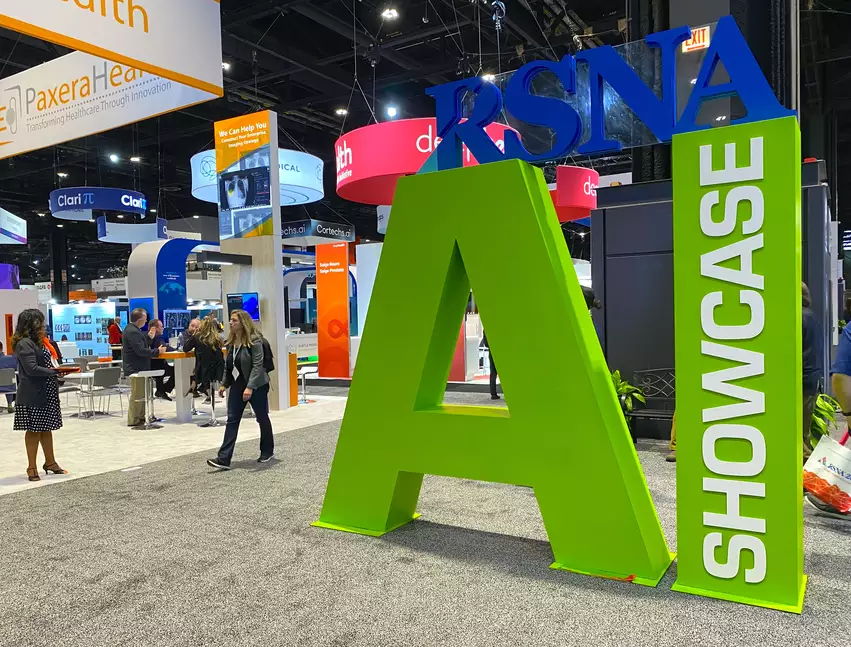FDA has now cleared 700 AI healthcare algorithms, more than 76% in radiology
There are now more than 692 market-cleared artificial intelligence (AI) medical algorithms available in the United States, according to the U.S. Food and Drug Administration (FDA) as of July 30, 2023. The vast majority of this AI is related to medical imaging and the number of new radiology algorithms continues to grow by more than 100 per year.
Additional clinical AI algorithms have also been cleared since July, but were not included in an FDA update on AI approvals the agency issued in November. Radiology makes up 76% of all the algorithms, with 521 earning FDA clearance to date. Many applications on the list for other specialities outside of radiology are directly related to imaging post-processing, so medical imaging over all accounts for more than 80% of the FDA cleared algorithms.
Here is the breakdown for the number of FDA-cleared algorithms across specialties:
• Radiology 527
• Cardiology 71
• Neurology 16
• Hematology 14
• Gastroenterology and urology 10
• Clinical chemistry 7
• Ophthalmic 7
• General and plastic surgery 5
• Anesthesiology 5
• Pathology 4
• Microbiology 4
• General Hospital 3
• Orthopedic 3
• Ear, nose and throat 2
• Dental 1
See the complete list of FDA-cleared algorithms here
The first AI algorithm was cleared by the FDA in 1995, and fewer than 50 algorithms were approved over the 18 years thereafter. However, the number has increased rapidly in the past decade, with more than half of algorithms on the U.S. market cleared between 2019 to 2022–– that's more than 300 apps in just four years.
In October 2023, the FDA said it had approved an additional 171 new AI and machine learning (ML) systems just the past year.
Medical imaging makes up the majority of FDA-cleared AI algorithms
The FDA said in addition to having the largest number of AI submissions for regulatory review, radiology has experienced the steadiest increase of AI/ML-enabled device submissions of any specialty.
With the vast majority of FDA-cleared AI being for medical imaging, it is not surprising that the largest radiology conference in the world has had AI as a major trend for several years running. At the 2023 Radiological Society of North America (RSNA) meeting in November, AI made up by far the largest exhibitor product category, according to RSNA. At least 242 vendors were showcasing at least one AI product on the expo floor. All of the large vendors across the vast RSNA show floor now exhibit FDA-cleared AI products as part of their regular discussions with attendees.
AI was seen as a way to help augment radiologists by making them more efficient and offer a second set of eyes to help catch things they missed. The technology is also increasingly being used to orchestrate work lists, perform measurements, auto-populate report fields, and speed up reading times. All of these efficiencies have now come to the forefront of discussions as radiology is experiencing a major shortage of radiologists and radiology technologists, and the the staff shortages are growing each year.
"Chances are AI is not going to replace us, but instead work with us. We need to see how AI can help radiologists improve their accuracy, efficiency and overall performance. We have a great mismatch right now between the great resignation, the loss of manpower and the exploding increase in demand," explained Michael Bruno, MD, vice chair for quality and patient safety at Penn State Milton S. Hershey Medical Center, who spoke on the shortage and ways to address it during RSNA.
Example of AI using a camera above a medical imaging scanner to check patient positioning on the bed to ensure they are in the center of the field of view and facing the proper direction for the exam protocol. This helps improve image quality and reduce retakes. This type of AI was found integrated into scanners across the RSNA 2023 expo floor, including all of the major imaging system manufactures. This example is from the GE Omni Legend PET-CT at RSNA 2023. Photo by Dave Fornell.
While tools specifically for the radiologist have been slow to see wide-spread adoption, AI tools that are integrated into PACS or the scanners themselves and operate in the background are seeing wider usage. This includes algorithms that auto segment anatomy in images and perform automated measurements, AI to reconstruct images to enhance quality on lower dose or shorter duration scans, and AI used to auto-center patients on CT scanners to improve image quality.
The areas of AI in radiology in imaging include:
• Diagnostic aids that can automatically identify critical findings.
• Automation of time-consuming functions such as quantification, contouring and auto complete of text in reports.
• Workflow improvements and automation.
• Data mining applications.
• Clinical decision support for next steps in the patient's care or to ensure imaging exam meets the guidelines.
• Modality specific AI to iso-center patients, choosing imaging protocols, or speeding MRI exam time.
• AI to enhance image reconstruction, to improve image quality, resolution, and identify and fix imaging artifacts.
• Guidance AI to help imagers get the best possible images, even if they are novice users of the system or are unfamiliar with the anatomy.
• Automatic anatomical identification, labeling and contouring of organs or specific types of tissue.
Insights from the the FDA AI approval list
The year-over-year increase of AI/ML-enabled device submissions to the FDA saw a large 39% increase in 2020 over 2019. The FDA said this slowed in 2021 by 15%, and 2022 by 14%. But the FDA said this is likely a calm before a coming storm of new AI technologies. Based on the projected volume in the second half of 2023 over what was seen in 2022, the increase of AI/ML-enabled devices is expected to reach 30% or more growth in 2024. It is very likely there will be continued strong growth in AI submissions for the years to come.
The FDA issued the following percentages for where the subspecialties where AI applications were approved in 2022:
• 87% radiology (122)
• 7% cardiovascular (10)
• 1% each neurology, hematology gastroenterology/urology, ophthalmic, clinical chemistry, and ear, nose and throat.
So far in 2023, from January through July, the FDA issues these statistics on new AI clearances:
• 79% radiology (85)
• 9% in cardiovascular (10)
• 5% neurology (5)
• 4% in gastroenterology/urology (4)
• 2% in anesthesiology (2)
• 1% each in ear, nose and throat (1), and ophthalmic (1).
In general, machine learning models submitted to the FDA have ranged in complexity from shallow (less than two hidden layers) models to more complex models (deep learning models), the agency said.
Models have generally trended toward more hybrid approaches, combining different algorithmic approaches to achieve the result of a safe and effective device. For example, using one model to generate features, and using another model to do classification.
The FDA said each AI submission is often thousands, if not tens of thousands, of pages long.
AI expanding into non-clinical areas of healthcare
AI algorithms do not require FDA clearance if they do not directly impact clinical care, and this type of use is also seeing rapid proliferation across healthcare.
Non-clinical AI is often used in IT systems to sort through the vast amounts of patient data to pull out relevant pieces of information for specific patient encounters. It is also used to search for population health traits. This data can target some patients for additional care or resources, streamline diagnosis or workflow or aid in data mining or identifying patterns in data, which can be very difficult for humans to do easily.
All of the non-clinical AI applications listed below are highlighted by hundreds of vendors at the large annual Health Information Management Systems Society (HIMSS) meeting.
The key areas where non-clinical AI is being implemented in healthcare includes:
• Population health
• Health tracking apps
• Identifying and addressing gaps in health equity
• Revenue cycle management streamlining
• Hospital-wide monitoring for length of stay, bed turn over rates, early sepsis detection and readmissions
• Data analytics for key performance indicators
• Enabling better patient wellness and preventative care



